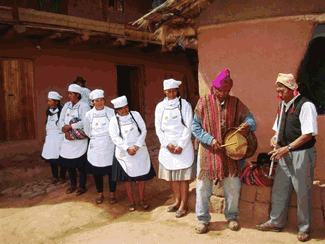
Andean Communities Benefit from Rural Community Tourism Program
May 14, 2013
The RUTAS Program has directly benefitted 160 families and
another 500 indirectly in indigenous communities surrounding
Cusco.
The development of a value-added tourism industry provides income and social wellbeing for agrarian communities.
The development of a value-added tourism industry provides income and social wellbeing for agrarian communities.
(Lima, May of 2013) - Some 660 families in eight agrarian
communities in the Pisac, Lamay, Coya, Urubamba and Ollantaytambo
districts of Peru's Cusco region are the beneficiaries of the RUTAS
Program: Community Tourism Destinations and Sustainable Quality in
Latin America, spearheaded by the CODESPA Foundation with support
from CAF-development bank of Latin America.
Eleonora Silva, CAF's representing director in Peru, underscored how the RUTAS Program, which has already improved the quality of life for 3,000 families in Bolivia and Ecuador, seeks to bring about inclusive economic development in agrarian and indigenous communities via the development of a value-added tourism industry whose primary objective is to generate revenue and bring about social wellbeing.
"The program focuses on identifying leaders and recognizing their talents as well as empowering community women and strengthen ties linking the business sector with families and communities. Additionally, the program aims to train community members with business and marketing skills in the hospitality, restaurant, customer service and other industries in a way that will prepare them to generate strategic alliances with the public and private sectors," said Silva.
Silva praised the combined efforts among CAF, CODESPA, regional and local governments, civil organizations, travel agencies, tour operators and other private entities to include indigenous populations in the tourism industry with the aim of generating economic benefits and improving living conditions via the responsible and sustainable use of natural and cultural resources within their communities.
"RUTAS is increasing income as it directly benefits 160 indigenous families and another 500 indirectly in the communities of Amaru, Huayllafara, Janan Chuquibamba, Chumpe, Patabamba, Chibubamba, Cachiccata and Socma, which make up the La Tierra de los Yachaqs Association, who, by improving the quality of services offered to tourists in the area, including lodging, electricity, sanitation, food and food handling, among others, are seeing higher standards of living for their families in the process," said Silva.
Separately, Marcelo Gandolfi, CODESPA's regional delegate, stressed that in Peru, Bolivia and Ecuador, rural tourism represents a tremendous opportunity for community development given that the region's social, natural and cultural assets allow for the creation of innovative tourism venues that complement existing options and inject a greater share of the industry's wealth into indigenous and rural communities.
In Peru, La Tierra de los Yachaqs Association sales teams are working directly with 137 travel agencies and tour operations of which 23 are already sending a steady flow of clients to communities involved in the project, while another 114 are in the process of closing similar agreements.
"Because of the heightened social impact, the CODESPA and CAF initiative has managed to tap co-financing and complementary assistance from public bodies such as Tourism Ministries in the three participating countries and also from 10 municipal governments as well as from foundations and private companies, all of which have been extremely important in making these types of projects sustainable in the region," said Gandolfi.
CAF's more recent content

CAF, ECLAC, IDB and PAHO Promote Sustainable Development in the G20
The Regional Organizations of the Americas congratulate Brazil on its successful G20 Presidency, highlighting its leadership on key issues such as poverty, governance, and climate change. They also reaffirm their commitment to actions that promote equity and development in the region.
Urgent Call for Action to Safeguard Caribbean SIDS at CAF Symposium
As the global community grapples with the escalating climate crisis, Caribbean Small Island Developing States (SIDS) are running out of time to secure critical investments and support needed to strengthen their economies and protect vulnerable communities from the intensifying impacts of climate change. With the window to take decisive action rapidly shrinking, CAF - Development Bank of Latin America and the Caribbean, in partnership with the Commonwealth Secretariat and the Antigua and Barbuda High Commission, brought together key stakeholders for a symposium in London to address the critical vulnerabilities Caribbean SIDS face.